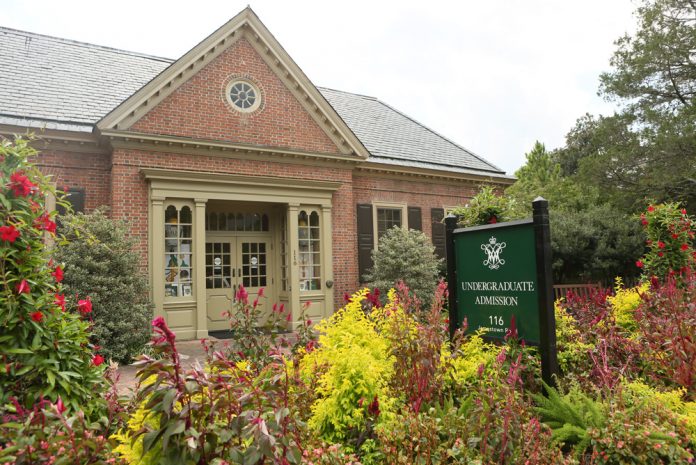After an unprecedented admissions cycle conducted almost entirely online, the College of William and Mary received a record number of applications from students seeking to join the College’s class of 2025.
According to Associate Provost for Enrollment and Dean of Admissions Tim Wolfe ’95 M.Ed ’01, the College received almost 17,400 applications from prospective students, an increase of 23% from last year’s admissions cycle of approximately 14,200 applications. Wolfe said that this was the first time the Office of Undergraduate Admission had received more than 15,000 applications, and he noted that the cycle likely saw the largest single-year increase in the College’s history. The College hopes to matriculate a class just shy of 1,600 students.
“We believe, as far as we can tell, it’s the largest single year increase, both in terms of volume and percentage increase, at least over the last few decades that we’re aware of,” Wolfe said. “It’s definitely a significant jump.”
“We believe, as far as we can tell, it’s the largest single year increase, both in terms of volume and percentage increase, at least over the last few decades that we’re aware of,” Wolfe said. “It’s definitely a significant jump.”
Applications were up across the board, both among in-state and out-of-state students, as well as from first-generation students and students of color. While the College’s two early decision options saw modest increases in application numbers, the bulk of this cycle’s increased activity came from regular decision applicants, who will hear back about their application status by April 1.
The record application numbers came as somewhat of a surprise to the Office of Undergraduate Admission. Wolfe said that during the spring and summer, he and his colleagues were concerned that the continued effects of the COVID-19 pandemic on the college admissions process — most significantly, students’ inability to visit campus in-person — would result in fewer students submitting applications than in previous cycles.
However, as the fall semester began, Wolfe said that things started to change and that the College’s application numbers instead projected positive news. He said this may be due to his office’s successful push to host virtual tours, information sessions and interviews in lieu of in-person visits.
“We really didn’t know what to expect,” Wolfe said. “We certainly had some concerns that without students being able to get out and visit colleges that we might not have the volume of applications that we ended up with. As the fall moved forward and we started seeing the applications coming in … those numbers were all pointing up and clearly were showing that we were running ahead.”
Nationally, application numbers appear to have increased at other selective universities like the College, though there has not been a consistent trend across all higher education institutions.
Wolfe said that some universities have even experienced significant declines in application numbers.
Wolfe partially attributed the College’s success in attracting applicants this cycle to the College’s provisional test-optional policy, which enabled prospective students to apply without submitting ACT or SAT exam results. The test-optional policy was introduced in spring 2020 in response to widespread accessibility concerns caused by the COVID-19 pandemic, but Wolfe said the College had been planning to introduce the policy even before the pandemic. The test-optional policy is currently being used as part of a three-year pilot program.
“We made the announcement last spring that we were going to move to a test-optional process,” Wolfe said. “… While the path in that direction may have been sped up as a result of the COVID pandemic, it was not solely because of that. It was something we were already considering and if we were going to go that route, we wanted to be able to do it over multiple years so we could evaluate that.”
“We made the announcement last spring that we were going to move to a test-optional process,” Wolfe said. “… While the path in that direction may have been sped up as a result of the COVID pandemic, it was not solely because of that. It was something we were already considering and if we were going to go that route, we wanted to be able to do it over multiple years so we could evaluate that.”
Wolfe said that the College’s test-optional policy marked a significant step forward in improving access to the application process.
“I’m very glad we did, because I think without a doubt, it is very clear providing that flexibility and option was absolutely necessary and beneficial to students this year,” Wolfe said. “I think even post-pandemic, that is a clear step for access and allowing, enabling and empowering students to be able to apply with the test-optional process.”
Applications from prospective first-generation college students and students of color also rose during the 2020-21 cycle, which Wolfe linked to the College’s provision of fee waivers to first-generation applicants, as well as its partnership with the Posse Foundation.
The College and the Posse Foundation announced the partnership last October, which will provide scholarships to a diverse set of students. The College hopes to welcome its first cohort of Posse scholars soon.
With so many competitive applicants, Wolfe said that the College will have to make some challenging decisions about which students to admit in the coming months, though he is confident that the class of 2025 will be among the most diverse and well-qualified classes yet.
“We’re happy to see that because it means we have a fantastic applicant pool in front of us,” Wolfe said. “We also recognize that it means we’re going to be very, very busy in the coming months, as we try to read through all the applications and know that we’re going to have to make some very difficult decisions.”

